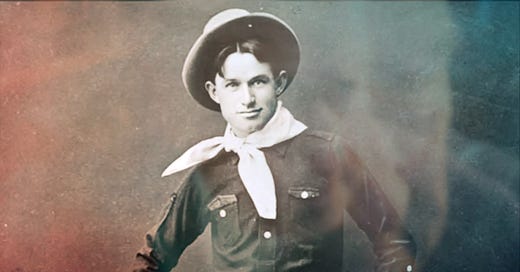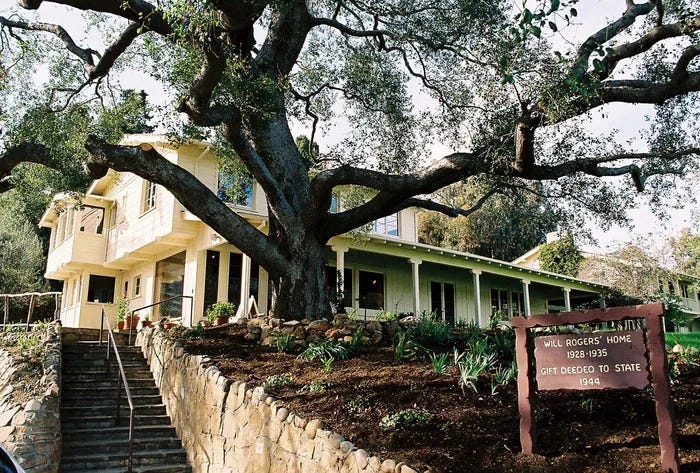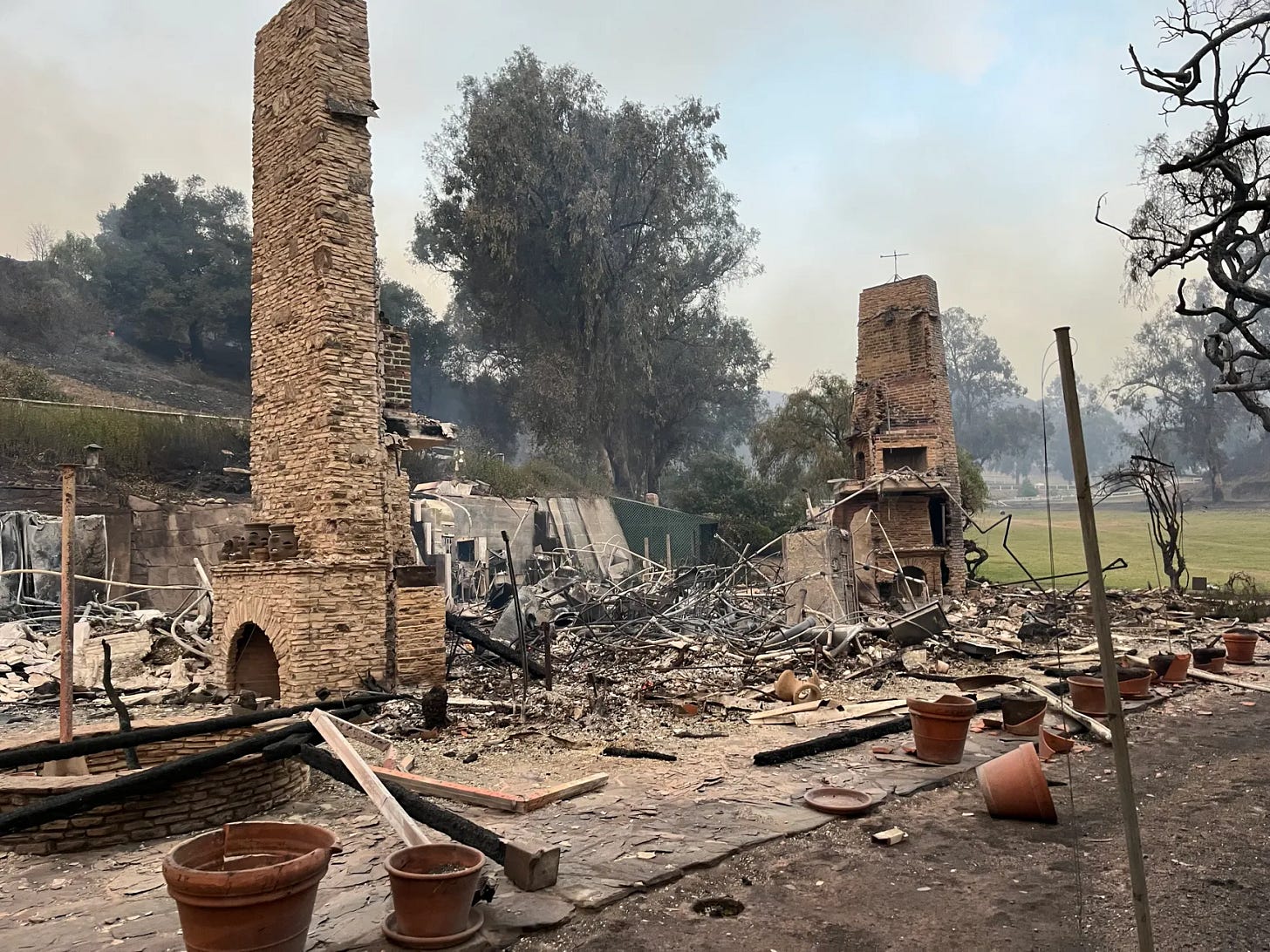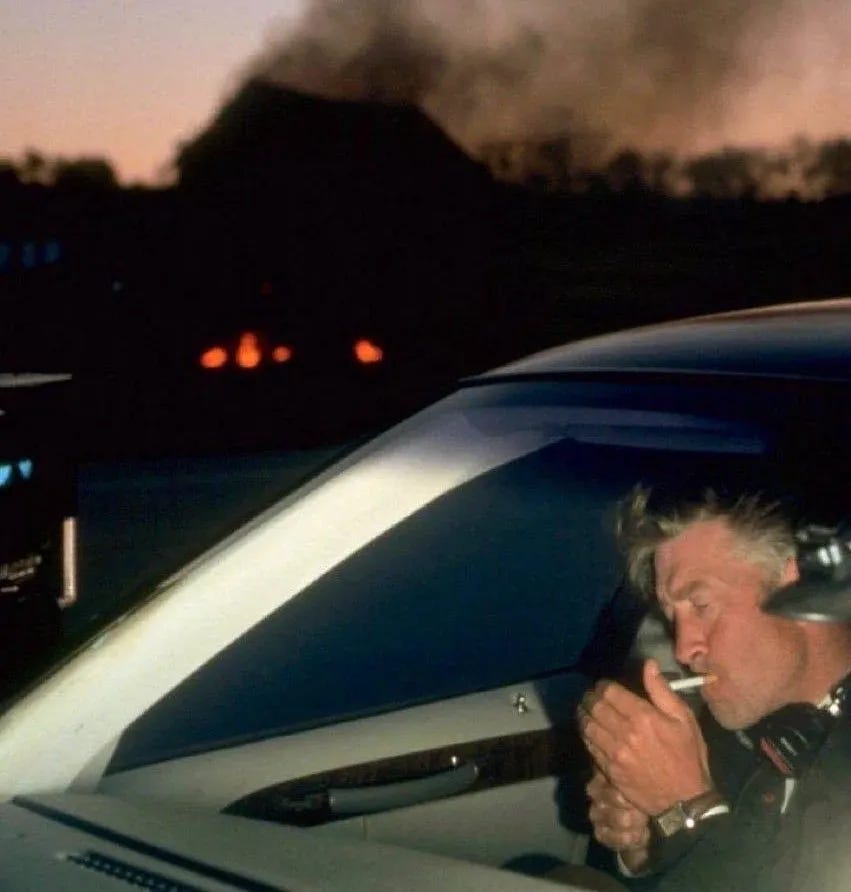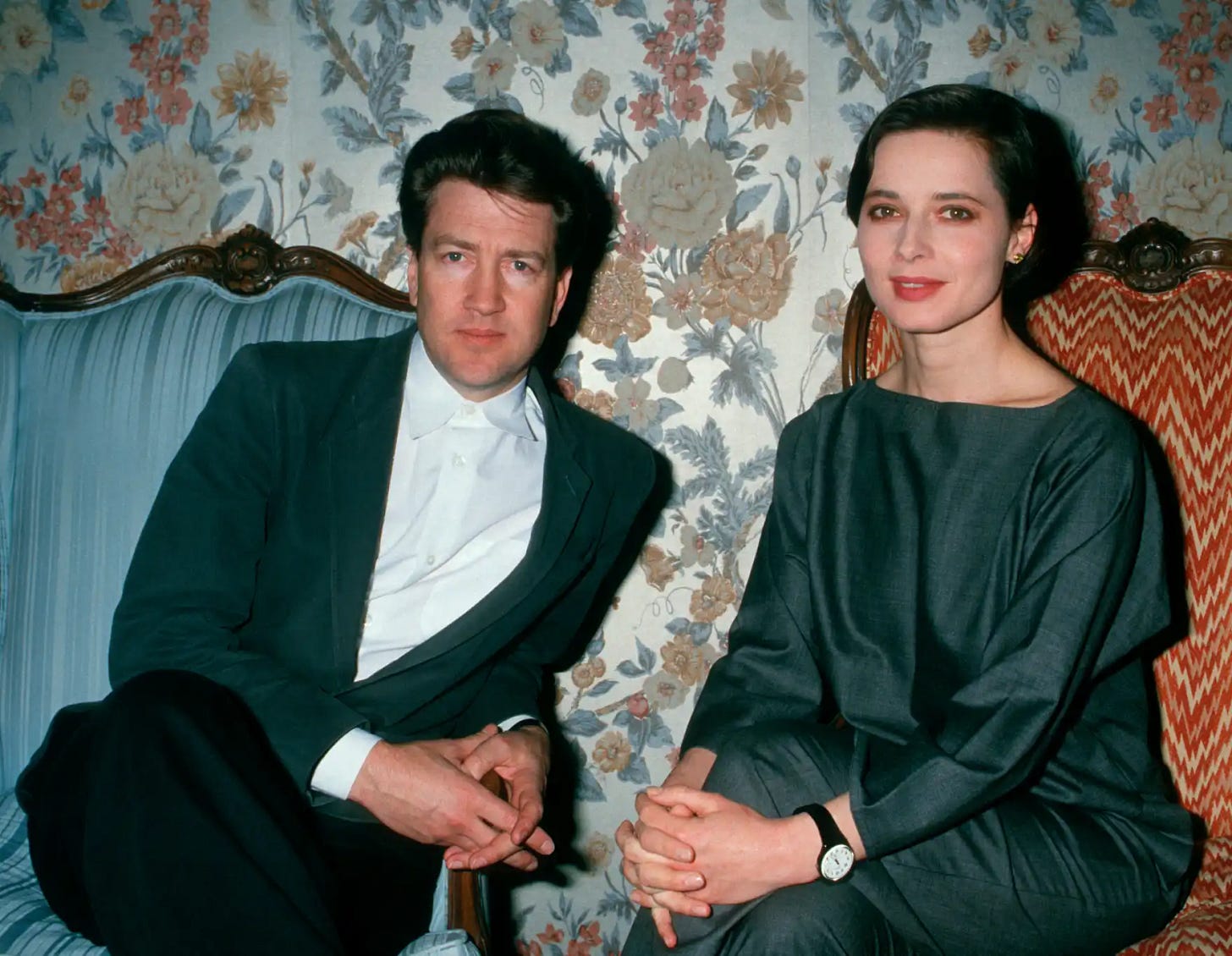Where There's A Will
He was the highest paid movie star in Hollywood. #1 on the radio. Read by 41 million Americans daily. The incredible story of WILL ROGERS, whose ranch was lost in the LA Fires. Plus: RIP DAVID LYNCH
”A man's attitude... a man's attitude goes some ways. The way his life will be.” - The Cowboy, Mulholland Drive (2001), David Lynch
Wildfires have ravaged Los Angeles for 10 days now, claiming at least 25 lives and reducing thousands of homes and businesses to ash. The devastation is beyond comprehension. “It is a mass erasure of heritage,” said Adrian Scott Fine, chief executive of the Conservancy, a nonprofit devoted to historic preservation. “We haven’t seen anything like this before.”
Among the casualties were several heritage sites of early Hollywood, an era already slipping into obscurity. One such landmark was the Will Rogers Ranch, a 31-room estate nestled in the Santa Monica Mountains, complete with a stable, polo field, and golf course.
The name Will Rogers carries little meaning these days. Some might vaguely recall him as a cowboy of yesteryear, while others - like me - confuse him with a bygone regional fast-food chain, Roy Rogers. For most, the name holds no significance.
After hours of doomscrolling and listening to heart-wrenching updates from friends in LA, I set my phone aside on Sunday and, seeking a distraction, Googled “Will Rogers.” What I discovered near knocked me off my saddle.
The Cherokee Kid
Will was born in the sprawling, unincorporated prairies of Oklahoma in 1879. His father, Samuel, was a war veteran, judge, attorney, and prominent leader within the Cherokee Nation. His mother, also Cherokee, passed away when Will was still young - he was her eighth and final child. After a freed slave taught young Will the art of lassoing, he quit school and moved to Higgins, Texas, to become a cowboy. Soon after, he drifted south to Argentina to work as a gaucho in the Pampas, only to find himself out of money. Too embarrassed to return home, he set sail for Africa.
Will’s top-notch trick roping caught the attention of Texas Jack’s American Circus and Wild West Show in South Africa, where he was hired to perform as a bronco rider and lasso thrower under the stage name “The Cherokee Kid.”
Upon returning to the United States, Will showcased his cowboy tricks in vaudeville performances, captivating audiences from Chicago to New York City’s Madison Square Garden where, during a horse show, he heroically roped a runaway steer that had stormed the stands - a feat that catapulted him to national fame.
By 1915, Will had ascended to the ranks of performers like W.C. Fields and Fanny Brice in the Ziegfeld Follies, where he twirled twine as he spun humorous yarns, often delivering topical jokes about the day’s headlines. Will gleefully skewered politicians of both parties, calling out their egos, hypocrisy, and corruption with wit and charm.
“I have a scheme for stopping war. No nation is allowed to enter war until they've paid for the last one.” - Will Rogers
The Most Dangerous Writer Alive
Will Rogers put two million words in print during his lifetime. Starting in 1922, the New York Times syndicated his weekly newspaper column, which reached a staggering 40 million readers at its peak - about a third of the U.S. population back then. By comparison, the most popular podcaster today, Joe Rogan, draws around 11 million listeners per episode, or roughly 3.22% of the U.S. population. Rogers was also a radio star - his Sunday evening comedy program is credited with popularizing radio. In modern terms, he was America’s first Substacking, podcasting mega-influencer, and the Palisades ranch, which he acquired in 1922, was his hype house.
H. L. Mencken dubbed Will Rogers “the most dangerous writer alive today.” A plain-speaking “Cowboy Philosopher” with a razor wit, Rogers was unshackled by institutional constraints - and, thankfully, untainted by the authoritarian ambitions of today’s faux cowboy oligarchs. During the Great Depression, Will provided both comfort and amusement, earning the title “the most trusted man in America.” He encouraged Americans to avoid politicizing every issue (ahem), instead focusing on more meaningful pursuits - family, friends, community, and work. His political opinions, when he expressed them, carried immense weight. President Franklin D. Roosevelt would phone Rogers - a lot - seeking his support on various issues. One anonymous Washington statesman noted, “You can never have another war in this country unless Will Rogers is for it.”
At the same time, Will Rogers was conquering Hollywood. Starting with Laughing Bill Hyde in 1918, he made 48 silent movies before becoming a true star in the “talkie” era. By the mid-1930s, Will Rogers was the highest paid star in Hollywood. He sold out national lecture tours and was the first comedian to ever play Carnegie Hall. He hosted the sixth annual Academy Awards ceremony (the first and only Native American host) and he was even named the honorary mayor of Beverly Hills.
At the height of his fame, Will Rogers was flying a small plane with his aviator friend (and fellow Oklahoman) Wiley Post when they crashed outside of Port Barrow, Alaska. Both men died instantly. Rogers was only 55 years old.
The nation grieved deeply. Stores closed, flags were lowered, and ABC and NBC went off the air during his funeral. Despite his profound impact, Rogers’ legacy has dimmed over the decades. In 1944, his wife, Betty, donated their Palisades ranch to the public as a State Historic Park and museum. Until 10 days ago, it remained a vibrant refuge for wildlife, hikers, horseback riders, and schoolchildren on field trips.
Footprints In The Dust
Winds have eased in Los Angeles, and flames are being subdued. But the terrible pain and sadness will linger, perhaps mingling with the figurative ashes of other recent devastations - the erosion of Hollywood, and the unraveling of the neoliberal order. The question now is: What will rise from these ashes?
Like Bob Hope and other icons of the Greatest Generation, Will Rogers’s folksy everyman persona was dismissed by Baby Boomers as “corny,” which may explain why he is all but forgotten today. But perhaps some earnest cowboy philosophy is just what we need to navigate the unmarked trail ahead. Here are six quotes from Will Rogers, and a few words on how we might apply them in the movie biz - and to life in general.
6. “It’s great to be great, but it’s greater to be human.”
Too often, we measure worth by wealth, status, and power alone. The film industry has come to prioritize safe IP-based cash grabs over new human stories, and audiences have been conditioned to this gold rush mentality, seeing profit as the sole indicator of value. There’s nothing wrong with enjoying blockbuster entertainment - I certainly do. But we are grappling with SO, SO, SO many challenges, and superheroes can’t save us. I believe we need a wider range of meaningful human narratives more than ever.
5. “If you find yourself in a hole, stop digging.”
The current state of the film industry is unsustainable - both creatively and economically. Years of bad decisions, from excessive reliance on sequels to the concentration of power in a few massive conglomerates, have led us here. We can continue digging deeper into a business model that will fail everyone in the long term, or we can rethink how we make and consume movies.
This means embracing production and distribution models outside of the Hollywood system. The opportunity to course-correct is here, as is the appetite for anti-trust, but it will require better judgement. Lucky for us, as Will Rogers said, “Good judgment comes from experience, and a lot of that comes from bad judgment.”
4. “Never miss a good chance to shut up.”
In the modern stampede of social media, news cycles, and hot takes, everything has become politicized, making it easy to feel overwhelmed and reactive. Movies must resist this pressure from both sides. The recent trend of embedding paper-thin progressive messaging into entertainment has alienated large swaths of the audience. What’s needed, I believe, is a return to storytelling that rises above politics and focuses on universal human experiences. By doing so, we can draw audiences of all backgrounds back to the movies, which will lead to greater profitability.
3. “Even if you're on the right track, you'll get run over if you just sit there.”
Substacks, podcasts, and Twitter threads are valuable for sharing ideas, but it’s the doing that gets results. Passive analysis in the face of overwhelming challenges is a luxury we can no longer afford. I believe we should embrace the cowboy spirit of bold, decisive action. For myself, that means embarking on film projects outside of the traditional Hollywood system, while actively supporting newer filmmakers as they do the same.
2. “Nothing makes a man broad minded like adversity.”
So much of modern life is designed around avoiding discomfort. But the truth is, adversity can be a gift - forcing us to confront our limitations, question our assumptions, and embrace change. The film industry is facing unprecedented challenges from streaming, AI and cultural shifts. These crises might very well be opportunities in disguise. In overcoming challenges, Will implies, we become more resilient, open-minded, and compassionate. Adversity is not something to fear, but an opportunity for growth.
1. “I never met a man I didn’t like.”
Perhaps Will’s most famous quote, it reflects his belief in the inherent goodness of people. Approaching others with openness, kindness, and curiosity invites connection rather than division. This is what movies help us do, I believe - it is the height of their power. Will believed in “critical yet charitable” thinking - challenging each other’s ideas while always keeping a healthy dose of goodwill. In a world that’s quick to judge and quicker to divide, maybe it’s time we followed Will’s lead to look for the best in every person we meet.
And now, this Week’s Underexposed Movie Pick:
The Straight Story (1999)
Drama/Road ‧ 1h 52m. As if this week couldn't get worse, David Lynch passed away yesterday. Last August, Lynch revealed that a lifetime of smoking had left him housebound with severe emphysema. His condition deteriorated last week, reportedly due to the smoke from the LA wildfires.
Lynch’s enigmatic and mesmerizing films, known for their dark themes and surreal images, will haunt our dreams for years to come. But did you know that he also once directed a G-rated Disney film?
The Straight Story follows Alvin Straight (Richard Farnsworth), a retired farmer and widower in his 70s, who learns that his estranged brother Lyle (Harry Dean Stanton) has suffered a stroke. Determined to mend their relationship before it's too late, Alvin embarks on a 240-mile journey from Iowa to Wisconsin on his old lawnmower.
Based on the true story of Alvin Straight and filmed along the actual route he took, the movie was originally meant to star Chris Farley and his real-life brothers (sadly, Farley died in 1997). Farnsworth was battling terminal bone cancer during the film's production, and received an Oscar nomination for his portrayal. Lynch referred to The Straight Story as his “most experimental movie.”
Where To Watch The Straight Story
Currently streaming on Disney Plus.
Also available to rent and buy on disc from Amazon.
News Reel
- is back with another great essay, Against Cinematic Television: “The power of cinema lies in its self-containment, that perfect beginning-middle-end structure that, to paraphrase director James Gray, plunges through your chest like a locomotive.” Happy to see my C-Word essay described herein as “canonical.”
“To watch Los Angeles burn feels like losing America’s collective consciousness. It’s the destruction of childhood escape, the annihilation of fake places remembered more vividly than real ones. It is grief by association. That this devastation arrives as the film and television industries crumble, fragmented by streaming platforms and corporate assaults on human creativity, makes the feeling harder to process. I’m grieving invented places and the real people who make them. I’m grieving future fictional worlds that may never be born and the manmade circumstances that birthed a cinematic inferno.” - Sarah Kendzior.
A veteran TV writer and WGA member has embarked on a controversial new Substack venture, The AI Writers Room, where he promotes “ethical and transparent” "experimentation with AI: “We need to work to prioritize humanity over technology in our industry. We need to talk about job displacement and how to train people in our industry to use these new tools. These are complex issues, and I want to raise them and start an intelligent discussion about them here.” I’m cautiously intrigued by this perspective. As someone who deeply distrusts the companies wielding AI, I am open to the idea that transparency and engagement *might* be more productive than head-in-the-sand resistance. But I admit, I’m genuinely unsure. What do you think?
“A thing that is free is of no earthly importance,” Will Rogers once said. And though Underexposed is a free publication, paid subscribers receive extra articles, videos and other exclusives. If you value what you’re reading here and want to support it, consider subscribing:
That’s all for the free version. Thank you all for reading Underexposed, and WELCOME to all you new paid subscribers - there’s a lot more of you suddenly! I’m so grateful for your support. Now meet me behind the paywall for some after-hours shenanigans!
In Heaven, Everything Is Fine
Down here, not so much. Here’s an Underexposed shrine / collage of David Lynch esoterica:
Keep reading with a 7-day free trial
Subscribe to Underexposed to keep reading this post and get 7 days of free access to the full post archives.

